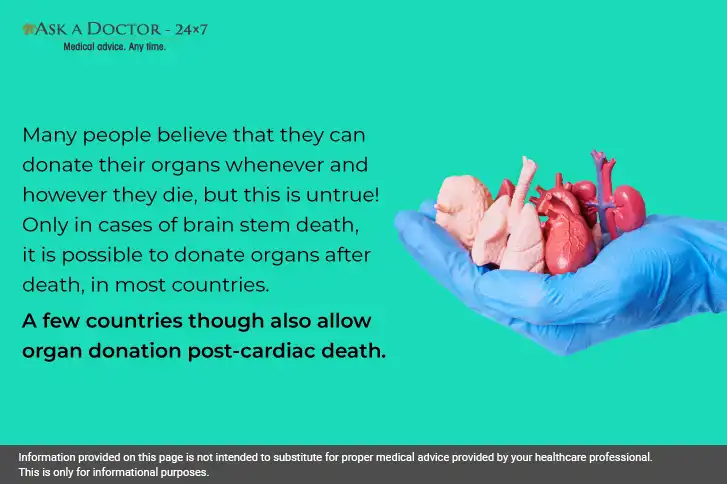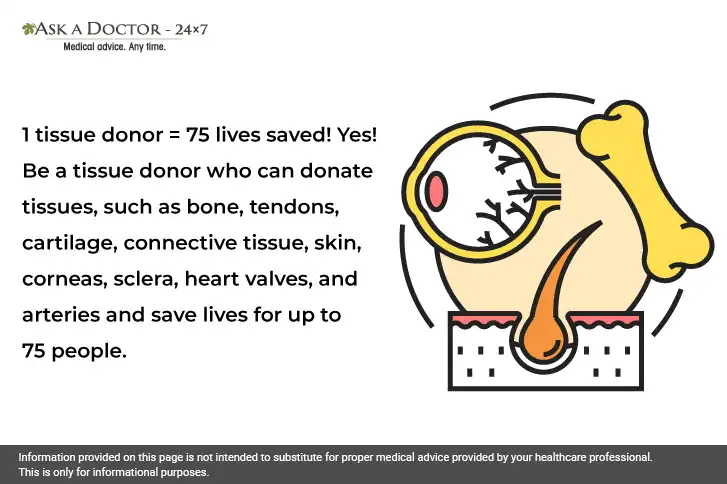5 Facts And Five Advantages Of Organ Donation
An organ transplant is required when any patient's organ deteriorates and constantly has improper functioning. Through an organ transplant, a person's life can be prolonged and those dealing with chronic illnesses can again live a normal life. A healthy organ is removed by surgeons from a donor who willingly desires to donate and it is safely then transplanted into the recipient's body. The organs that can be transplanted are the kidney, liver, heart, lungs, and more.
Over time, there has been a noticeable increase in the need for organ donors. The need is increasing because there are more patients with end-stage organ failure than earlier. Also, with the advancements made in the transplantation process nowadays, there are more patients eligible for organ transplants because of advancements in transplantation. You can register for organ donation at the national registry centers, or at the respective state-recognized transplant centers, or can register yourself as a potential donor by filling out the organ donation pledge form and getting enrolled in the registry of potential donors.
Let’s understand through this article, the facts and advantages of organ donation.
Types of Organ Donation

It could take weeks, months, or even longer for those in need of an organ to find a donor. There are two legal ways to obtain an organ:
- A person can wait for a donor to become available on the transplant list.
- A person can find a donor. This is usually a family member or friend of the person who needs a transplant, but some people are willing to donate to people they don’t know. Some people even advertise for donors using social media, radio, or billboards.
There are two different types of organ donations, which are as follows:
1) Living Organ Donation
A living person can donate one kidney, a portion of their liver, or a portion of their pancreas during an organ transplant surgery. They must be in reasonably good health.
2) Deceased Organ Donation
An organ may be donated in whole or in part at the time of the donor's passing if living organ donation is not an option. When a deceased person donates their organs, they are either declared brain dead in the hospital or are ventilated. Remember that organ donation from a deceased person can only occur once the patient has been certified brain dead and all measures to save them have been exhausted. A person is said to be brain stem dead when there is an irreversible loss of consciousness, brain stem reflexes are absent, and there is an irreversible loss of ability to breathe.
5 FAQs Related to Organ Donation
Read below some common queries people ask before contemplating an organ donation:
1) Who is eligible to give an organ?
Being an organ donor is possible for almost everyone, at any age. A parent or guardian's approval is required for anyone under eighteen.
A medical evaluation will be conducted to ascertain whether organs are suitable for donation after death. Organ donation would be prohibited for people dealing with diseases like HIV infection, cancer that is rapidly spreading, and other chronic illnesses such as diabetes, HIV, cancer, kidney disease, or heart disease.
2) Can I donate my organs while I'm still living?
It is possible to donate a liver lobe or a single kidney while you are still alive. Non-directed or altruistic donations are those made by those who prefer to be living donors for strangers; these donations typically occur among family members or close friends.
3) Does Donating Organs Affect Funeral and Burial Services?
No, following organ donation, nothing changes. Funeral arrangements and burial preparations can go exactly as they would have if the donor had not given their organs. Furthermore, having an open casket at a funeral is not prohibited by organ donation.
4) How long can an organ survive once retrieved from the donor?
Once the organs have been retrieved, they cannot be kept outside the body for very long and need to be transplanted quickly. The average shelf life of an organ outside the body is:
- Lungs and heart: 4 to 6 hours
- Liver: 6–12 hours
- Kidney: Up to 30 hours
- Intestine: 6 hours
- Pancreas: 6 hours
5) How long does it take to recover from organ transplant surgery?
It can take two to six months to fully recuperate from organ transplant surgery, regardless of whether you are the recipient of the organs or a living donor. Depending on the kind of transplant you underwent, you could need to spend a few days to a few weeks in the hospital. You could require a helping hand at home and one to two months of leave from work. You should anticipate some level of discomfort and physical limitation during your recuperation.
Four Facts About Organ Donation You Must Know

Read below some common facts about organ donation:
1. Organ donation not only saves lives but also enhances the recipient's quality of life: Individuals who receive organ transplants have a statistically higher chance of living longer than those who require a transplant but choose not to obtain it. e.g., there is a higher quality of life in kidney transplant patients due to fewer limitations on their daily activities than in those who continue on dialysis.
Not one, but many people can be saved by one organ donor: Up to eight lives can be saved by a single deceased organ donor! If you decide to donate your organs and tissues after death, you can:
- Preserve as many as eight lives.
- Restore two people's sight.
- Heal up to 75 burn and wound patients.
- Assist someone in restoring their face or hand.
If you decide to be a living donor, you can:
- Preserve the life of an acquaintance.
- Prevent them from having to wait around, growing sicker forever.
- Give them an organ that is healthier than they may otherwise get.
- Save two lives by giving the next organ to someone else on the waiting list.
2. Organ donation can be a rewarding and positive experience: It is the noblest act of humanity. World Organ Donation Day (13th August) inspires people to commit to organ donation after death. Become an organ donor and give someone one of the most precious gifts - The Gift of Life.
3. A donor can have a normal life even after a transplant: If you are in good health, there will probably not be any specific dietary restrictions. For example, after a kidney donation, the remaining kidney increases in size and takes over the job of filtering blood.
4. The organ donor’s family is not charged for the donation: There is no cost to organ donors or their families. Usually, the insurance companies or the people who receive the organ donation pay the cost to the hospitals or service providers.
Conclusion
Thus, one of the biggest breakthroughs in contemporary medicine is organ transplantation. It gives people with life-threatening illnesses or accidents to their key organs, regardless of age, a second shot at life. Nearly everyone can donate tissue or organs. There is no set age limit, religion, or ethnicity. People interested in donating an organ can refer to specialists to determine which of their parts are suitable for transplantation and donation. Only after assessing your organs and tissues are doctors can let you know about your eligibility and other details related to organ donation. In the case of living organ donation, healthcare professionals will evaluate your overall health and the condition of your organ before allowing you to donate.
If you have any questions regarding organ donation, you can Ask a Specialist at Ask a Doctor, 24x7.
Recently Answered Queries Related to Organ Donation
- What Causes the Build Up Of Fluid In The Body Post Heart Transplantation?
- Does Taking Microgynon Result In Having Elevated Creatin Level?
- Do The Following Test Reports Suggest Kidney Transplant?
- Can Kidney Be Donated if the Donor Is A Smoker?
- What Could Be The Theoritical Age Of Internal Organs After Transplantation?
- Is Body Donation A Good Thing To Do?
Disclaimer: Information provided on this page is not intended to substitute for proper medical advice provided by your healthcare professional. This is only for informational purposes.
Ask a Specialist
Recent Questions


